
Topics
Guests
- Susan FaludiPulitzer Prize-winning journalist and author of the new book The Terror Dream: Fear and Fantasy in Post-9/11 America. She is also the author of Backlash and Stiffed.
In her new book, leading social critic and Pulitzer-winning journalist Susan Faludi examines the cultural impact of the 9/11 attacks and concludes that the United States has been living in a myth since. She explores how the attacks led to the denigration of women here in the United States, the magnification of manly men and the call for greater domesticity. Faludi joins us to talk about the Bush administration’s use of feminism to launch the war on Afghanistan, the case of Private Jessica Lynch, the Republican “W. Stands for Women” campaign, and more. [includes rush transcript]
Transcript
JUAN GONZÁLEZ: Six years ago this Sunday, the U.S. invasion of Afghanistan began. Fifty cruise missiles were launched from submarines in the Arabian Sea. B-52 and B-2 stealth bombers began air strikes. The Pentagon called the attack Operation Enduring Freedom. The invasion came less than a month after 9/11. Among the Bush administration’s goals were the capture of Osama bin Laden and the dismantling of the Taliban.
Six years later, neither objective has been realized. Forty thousand U.S. and NATO forces remain in Afghanistan, and the United Nations recently revealed violence has reached a new high.
Another objective of the war was the liberation of Afghani women. Shortly after the war began, Laura Bush became the only first lady in history to record a full presidential radio address. She addressed the plight of women in Afghanistan.
LAURA BUSH: Good morning. I’m Laura Bush, and I’m delivering this week’s radio address to kick off a worldwide effort to focus on the brutality against women and children by the al-Qaeda terrorist network and the regime it supports in Afghanistan, the Taliban. That regime is now in retreat across much of the country, and the people of Afghanistan, especially women, are rejoicing. Afghan women know through hard experience what the rest of the world is discovering: The brutal oppression of women is a central goal of the terrorists. The fight against terrorism is also a fight for the rights and dignity of women.
JUAN GONZÁLEZ: Laura Bush, speaking in November of 2001. The Bush administration’s use of feminists to help make the case for the war in Afghanistan is one of the many topics examined in a new book titled The Terror Dream: Fear and Fantasy in Post-9/11 America. It is written by one of the country’s leading social critics, Susan Faludi.
Faludi examines the current cultural impact of the 9/11 attacks and concludes that the United States has been living in a myth since 9/11, and she explores how the attacks led to the denigration of women here in the United States, the magnifying of manly men and the call for greater domesticity.
AMY GOODMAN: Susan Faludi is a Pulitzer Prize-winning journalist. Her previous books include Backlash: The Undeclared War Against American Women and Stiffed: The Betrayal of the American Man. She joins us in her first national broadcast interview today in our firehouse studio, as she begins a many-week tour around the country. Welcome, Susan.
SUSAN FALUDI: Thank you. Thank you for having me here.
AMY GOODMAN: Talk about the dream you had on September 11. Where were you?
SUSAN FALUDI: Well, I was in Los Angeles, so I was three hours behind the events. And very early in the morning, I had this peculiar dream, where in the dream I was sitting on an airplane next to another woman, and a young man came up to us and shot two bullets. One went into my throat at a sort of odd angle, and one into her throat at an odd angle. And I realized that we were both alive, but we couldn’t speak.
Now, I don’t pretend to be a psychic. I don’t know why I had this dream. But later it struck me that it had this remarkable metaphorical quality to it, because when I began to look at our response to 9/11, what repeated over and over was the silence, of the way that women were silenced and, more generally, the way our culture silenced any kind of questioning or examination of our reactions.
JUAN GONZÁLEZ: You say the silencing of women. You attempt to document what happened in news coverage after that. Could you explain that further?
SUSAN FALUDI: That, well, with women, Geneva Overholser, who was the former ombudsman — ombudswoman of The Washington Post, described how she picked up The Washington Post the next day, and they had expanded the opinion page from five to 10 columns, so there would be, you know, a supposed diversity of opinions. But even then, there were 10 male opinion makers and no women. And this was, as it turned out, no anomaly. In the first week, the major newspapers — the Post, the Times and the L.A. Times — had 88 op-eds; only five were by women. Meanwhile, on the Sunday morning — in the, you know, the important Sunday morning talk shows, there was a — in the first seven weeks after 9/11, there was a 40 percent plunge in representation of women guests, even women who you would think would be rather essential. Dianne Feinstein and Barbara Boxer both had subcommittees of terrorism, made no appearance on these shows.
AMY GOODMAN: You did mention Peggy Noonan had an op-ed piece — what was it — in The Wall Street Journal?
SUSAN FALUDI: That’s right. Well, “Welcome Back, Duke,” I think it was called, in which she said, “From the ashes of [Sept. 11] arise the manly virtues […] men who push things and pull things.” And this is only the most famous of scads of stories about the supposed return of John Wayne in the post-9/11 era.
JUAN GONZÁLEZ: Your book — I was fascinated by the way you connect what’s happened in 9/11 and through sort of the trend throughout the American psychology or American history, of — going back to the captivity literature and how the first colonists dealt with the whole issue of being attacked. And could you talk about that some?
SUSAN FALUDI: Right. Well, I’m trying to figure out why we reacted to 9/11 in this peculiar and particular way we did. You know, why was it all about home and hearth? Why was it about sort of artificially inflating men into superheroes and insisting that women go back to the home, because there were many stories after 9/11 making that argument?
And I ultimately traced this peculiarity into our earliest history, because as much as we kept hearing after 9/11 these attacks like this have never happened to us before, if you look at our earliest history, you see a very different story. First of all, you see that this has happened to us over and over again. For the first 200 years, the main feature of American life, early American life, was being attacked on, quote/unquote, “home soil.” Now, granted, this was land that the settlers took from the Indians. But from the settlers’ point of view, they regarded these attacks as assaults by people they demonized as non-white, non-Christian, quote/unquote, “terrorists.” That was actually the term used sometimes.
And in reaction to — and in these attacks in the first 200 years — forget about the Great Plains, but the early, you know, New England and Northeastern colonies — over and over again, leaders, militia, husbands, were not able to protect families in frontier towns. And out of that experience of feelings of vulnerability and humiliation, our culture, over a long period of time, starting in the 18th century and really culminating in the Victorian era, created a myth to paper over this vulnerability, and it was a — the myth is the myth of American invincibility based on a kind of domestic drama.
AMY GOODMAN: In your piece in the Times, “America’s Guardian Myths,” you start with Mary Rowlandson. Talk about the significance of her.
SUSAN FALUDI: Mary Rowlandson wrote probably the most famous captivity narrative. Captivity narratives originally in the Puritan times were, more often than not, told from the woman’s point of view. And Mary Rowlandson described how she was taken captive. Actually, it’s a kind of eerie and sort of hair-raising parallel to 9/11 in one way, in that, you know, at dawn this raid came on her little village of Lancaster, Massachusetts, and they all went into this garrison, a sort of supposedly fortified house.
JUAN GONZÁLEZ: A raid by Native Americans.
SUSAN FALUDI: Exactly, I’m sorry. And this was in King Philip’s War, which the settlers had much to do with provoking in the first place, but that’s another story. And the house was set on fire. And so, Mary Rowlandson and the others had the choice of, do we stay inside and burn, or do we go out into what looked like certain death, which certainly will ring a bell with those who watched TV on the morning of 9/11. But Mary Rowlandson was taken captive, and she wrote about her 11 weeks of captivity.
And what’s significant is, as much she was a, you know, traditional Puritan woman, seeping into the account over and over is her annoyance at the male militia for failing to rescue them, even at one point where the militia came within yards and then decided they couldn’t cross a river that the Indian party had crossed with no problem. And then she rather shrewdly negotiated with her captors, bartered using her knitting needles to get food and ultimately to win their approbation, and named her own ransom. And this is not that unusual. There were a number of women captives who either defended themselves, negotiated, or, extraordinarily, about a third of female captives actually chose to stay with their Indian captors, preferred the Indian life. So there was a lot of sort of gender confusion and gender reversals going on here, that the myth we created sort of turned around.
JUAN GONZÁLEZ: And you continue to trace that, obviously, through the period of American slavery, and the particular topic that I’m especially dealing with now, as I’m trying to complete a book on the history of racism in the American media and how the press and the media again sought to create an image of protection of women against, in this case, Africans and black slaves in the country.
SUSAN FALUDI: Well, after the Civil War, again — you know, these are moments, whether it’s after 9/11, where we felt we were vulnerable on home soil, or after the Civil War, when the defeated South felt that they were — you know, had been incapable of protecting their, you know, quote/unquote, “homeland” from incursion by Yankees. And as a response, there was a sort of resorting to this drama, much like the drama we saw after 9/11, of rescuing — of these rescue fantasies. And in the case of the post-Civil War era, it was a rescue drama of supposed white virgins from supposed, you know, savage freed black men who were alleged, completely wrongly, to have perpetrated an epidemic of rape. What’s interesting, in the — the Klan, obviously, built — you know, was the main perpetrator of this notion, which attracted at its heyday about five million men.
But when you go back and you look at the late 19th century, when this myth first, you know, finally evolved, particularly in the second half of the 19th century, one of its hallmarks was the idea that women — you know, because women must be vulnerable in order for — women’s weakness was required to shore up male strength, and the most sort of dramatic form of female vulnerability is sexual defilement, so these images of rape were all over popular culture in the second half of the 19th century.
AMY GOODMAN: We’re talking to Susan Faludi, the Pulitzer Prize-winning journalist. Her third book is out; it’s called The Terror Dream: Fear and Fantasy in Post-9/11 America. When we come back from break, we’re going to talk about the images today. We’ll talk about the renaming of the pile as Ground Zero. We’ll talk about the case of Jessica Lynch, the U.S. soldier, and the myth that was built around her.
[break]
AMY GOODMAN: Our guest, Susan Faludi, Pulitzer Prize-winning journalist, her latest book, The Terror Dream, just out this week, Fear and Fantasy in Post-9/11 America. Susan, talk about Jessica Lynch. Who was she? Tell us her story.
SUSAN FALUDI: Jessica Lynch, as probably most people remember, was a private in an Army maintenance company who went into Iraq in March of 2003, and her unit was basically left behind in the rush to get to Baghdad. The rest of the convoy zoomed ahead. And she wound up, along with, you know, the rest of her company, being ambushed in Nasiriyah. A number of her fellow soldiers were taken captive. She was terribly injured in a car wreck, where the Humvee she was in crashed into a Mack truck, and it jackknifed. So she wound up in an Iraqi hospital. And there was a great rescue drama that ensued.
The story we heard originally was that these, you know, Special Ops teams of brave men, armed with a night vision video camera so they could film themselves, came battling into this Iraqi hospital, which was supposedly overrun with Fedayeen death squads, and they rescued Lynch. The military hustled out a video of this drama only three hours later and woke up all the reporters in the middle of the night so they could see it.
Well, as it turns out, there was no battle. I mean, it took them six minutes, and there wasn’t one casualty. And there were no Fedayeen death squads, as the military actually knew, because they had been alerted by an Iraqi translator. It was just, you know, a bunch of doctors and nurses trying to take care of Lynch and actually trying to return her to the U.S. military.
AMY GOODMAN: Explain.
SUSAN FALUDI: Well, they bundled her into an ambulance and tried to drive her back, and they got to the military checkpoint, and American soldiers started shooting at the ambulance, so they had no choice but to go back to the hospital.
AMY GOODMAN: This is Jessica Lynch testifying before Congress on April 24 of this year.
JESSICA LYNCH: At my parents’ home in Wirt County, West Virginia, it was under siege by media, all repeating the story of the little girl Rambo from the hills of West Virginia who went down fighting. It was not true. I have repeatedly said, when asked, that if the stories about me helped inspire our troops and rally a nation, then perhaps there was some good. However, I am still confused as to why they chose to lie and tried to make me a legend, when the real heroics of my fellow soldiers that day were legendary.
AMY GOODMAN: Former Private Jessica Lynch. Go on from there, and also tell us about her book, her autobiography, supposedly.
SUSAN FALUDI: Well, right after the rescue, the media sort of bought this story hook — the American media bought this story hook, line and sinker. I mean, it was ultimately debunked by the British media, which went back and actually talked to the Iraqi doctors and nurses. It turned out she had extraordinarily attentive care and that this was — that the stories of her being abused and, you know, slapped and, as the media kept insinuating, tortured, were not true. She, herself, was in the hospital and couldn’t speak for herself, so everybody else did speak for her.
AMY GOODMAN: Rumsfeld’s role in this?
SUSAN FALUDI: Well, all of the — you know, there was this sort of repeated talk of “We’re so concerned about women,” supposedly. The White House put out to the media that Bush was very concerned about women in the military, you know, their safety. And there was this insinuation over again that perhaps, you know, she had been sexually assaulted. And there was, at the time, no evidence. But month after month went by where this was — I mean, sometimes to bizarre extent to get some kind of — drum up some sort of so-called evidence. At one point, People magazine was quoting a country music singer who said, “I just know she’s been abused.”
And so then, nine months into this, this book comes out that purports to be her story called I Am a Soldier, Too, written by the former New York Times reporter Rick Bragg. And the story, he mainly, like all the other reporters, focused on her early years. I mean, all these reporters went back and talked to, you know, her kindergarten teachers: “What was she like when she was five?” I mean, it was as if they wanted to return her to a little girl. And in the press, they constantly called her, you know, the tiny girl, the blonde waif, doll-like. But, you know, Rick Bragg’s book hit the bestseller list immediately, because of what was really only one or two sentences that said that medical records indicated that she was anally raped.
Well, first of all, the records themselves were extremely sketchy, that showed some sort of legions that could have been caused by all kinds of things, including the horrific car wreck she was in. But more importantly, Jessica Lynch herself was quite adamant that she had no memory of this. When I interviewed her, she said, “You know, I didn’t remember it then, I don’t remember it now, and I did not want this in the book.” But her wishes — and this book supposedly was her story — were ignored.
JUAN GONZÁLEZ: We had a clip at beginning of this segment on Afghanistan. And the whole Bush administration, part of their rationale of what’s going on in Afghanistan is the protection of Afghani women. Is this, in your view, a continuation of the same pattern of attempting to establish this myth of the macho John Wayne United States protecting women everywhere in the world?
SUSAN FALUDI: Very much so. I mean, you know, right away, the Bush administration was talking about — that we were going to — well, originally, they said we were going to liberate women in Afghanistan. And there was this very brief period of, you know, a couple weeks, where feminist leaders, much to their shock, as they had been pretty much iced out by the White House, were suddenly getting phone calls, sometimes on a weekly basis, asking for their advice. And they were brought in to talk to people in the State Department.
But that vanished as soon as — it was, you know, really used as one of a number of justifications for the invasion. Two weeks after the invasion in Afghanistan, the White House officials were saying, well, that’s no longer a priority. You know, liberation of women was never what it was about. It was about, we’re going to show ourselves to be dominant and invincible by taking care of these helpless women.
AMY GOODMAN: President Bush’s “W Stands for Women” campaign initiative. This is Vice President Dick Cheney’s wife, Lynne Cheney, speaking during the Republican National Convention in 2004.
LYNNE CHENEY: You know, one of the things that’s happened to me over the last three years is I will have people come up to me, and they say the same thing. It’s in different versions of it, but basically it’s something like this: “We are so glad that George Bush and your husband are in the White House.” And I know exactly what they mean. We live in times of peril; there is no question about that. These are times of great challenge for the American people. And it is such a comfort to all of us to have these good men, who are so solid, so stable, so strong, leading our country.
AMY GOODMAN: That’s Vice President Dick Cheney’s wife, Lynne Cheney. Susan Faludi?
SUSAN FALUDI: Well, the “W Stands for Women” campaign was one of the more dubious claims of the Bush administration, among many dubious claims, I suppose. But during the 2004 campaign, there was an effort to create, invent this sort of mythical security mom, who supposedly wanted a presidential sheriff to defend her and her children from harm. You would think that the terrorists had not aimed the planes at our symbols of financial and military power, but instead were invading the suburban gated communities.
AMY GOODMAN: This was the late Reverend Jerry Falwell — it was right after September 11, 2001 — appearing on Pat Robertson’s 700 Club, blaming liberal groups in the United States for the attacks.
REV. JERRY FALWELL: I really believe that the pagans and the abortionists and the feminists and the gays and the lesbians, who are actively trying to make that an alternative lifestyle, the ACLU, People for the American Way, all of them who tried to secularize America, I point the finger in their face and say, “You helped this happen.”
AMY GOODMAN: The late Reverend Jerry Falwell. Susan?
SUSAN FALUDI: He was the most sort of ludicrously cartoonish in his expression of this, and even his fellow neocons said, “You know, please don’t express this so extremely.” But if you go back and look at the kinds of things that were being said in the weeks and months after 9/11, there were an alarming number of articles and commentaries declaring, much like Falwell, although in more hedged terms, that 9/11 was going to cause the death of feminism. There were articles saying that — blaming feminists, saying feminists had weakened our military, had weakened our resolve, that feminism was unpatriotic. There was this whole message to women that they needed to sort of back off their demands for independence or, you know, face being regarded as almost treasonous.
JUAN GONZÁLEZ: And for those women who didn’t go along with the program, even in terms of their challenging how the administration handled 9/11, you talk about the victims who got together and began to challenge the Bush administration. What was the result?
SUSAN FALUDI: That’s right. Well, particularly the 9/11 widows, who were sort of dubbed in this sort of hero-and-victim story that the culture sort of ginned up, where the heroes were, by and large, men who died in the disaster, who you would think would be more victims than heroes, but then the victims, the defined victims, were largely the 9/11 widows whose husbands had died. And these widows were trotted out on every TV show and fawned over as long as they stuck to the script, which is this sort of helpless homemaker who’s willing to testify to their husband’s heroism and their own sort of helplessness.
But the minute those women stopped playing that role and started pushing the government for an accounting of the missteps that led to this disaster, the whole game changed. The Jersey Girls, as they called themselves, the four women whose husbands died in the World Trade Center, who almost single-handedly forced the creation of the 9/11 Commission, were just jumped on. They were — legislators, including the chairman of the Homeland Security at the time, in Congress told them, you know, that they should keep quiet and trust the government. In the conservative media, they were denounced as insufferable rock stars of grief, Democratic Party hacks. They were swift-boated, accused falsely of taking money from Democratic coffers.
AMY GOODMAN: You also talk about the militarization of what happened afterwards, that the civilians called it “the Pile” at Ground Zero, “the Pile” —
SUSAN FALUDI: Right.
JUAN GONZÁLEZ: And then it switched to “Ground Zero.” And you talk about the effect on men, the grieving firefighters, for example, but what they were supposed to be and who they actually were.
SUSAN FALUDI: Right. Well, it was the media that came up with the term “Ground Zero.” And the firefighters and the construction workers and everybody who was working and volunteers who were working down there referred to it as “the Pile.”
And the firefighters — in this sort of hero-and-victim system I was talking about, the firefighters, of course, were dubbed by the media the sort of leading heroic figures. And Rudy Giuliani, you know, went before the 9/11 Commission and talked about how the firefighters had actually chosen to stay in the towers and that they knew that the towers were going to collapse and they stayed there to help everyone get out. And, of course, as we know now, the truth is they stayed there because they didn’t have working radios, because — even though in 1993, in the last terrorist threat in the World Trade Center, those radios didn’t work. And that was just one of many failures by city leadership that led to the deaths of so many firefighters.
And the firefighters themselves, when you read the more than 500 oral history accounts they gave to the New York Fire Department after 9/11, the theme you hear repeated over and over again is, you know, “Hey, we were just as much victims as the other people in the towers.” There was one firefighter who said, “The only difference between us and the victims is we had flashlights.” But what happened is that the culture offered firefighters hero worship in place of the safety equipment, the economic support, the leadership plans they needed to do their jobs effectively.
AMY GOODMAN: And also, their ability to grieve, to weep, to cry.
SUSAN FALUDI: Yes. They were supposed to be stoical and, you know, were supposed to make us feel — basically make us feel better and cover up our own shame.
AMY GOODMAN: Well, Susan Faludi, I want to thank you for joining us — so much more to talk about, but it’s there in The Terror Dream: Fear and Fantasy in Post-9/11 America — the Pulitzer Prize-winning journalist who wrote, first, writing about women in Backlash, and then Stiffed, now The Terror Dream.

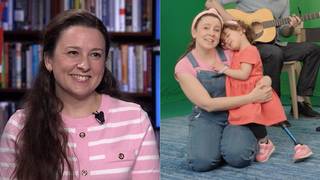
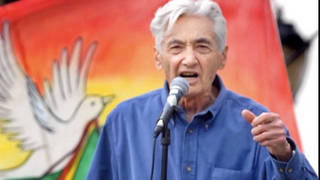
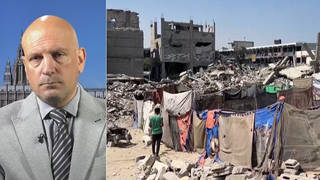
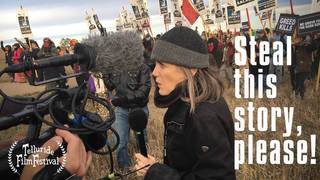





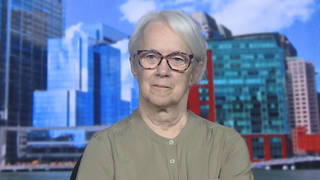
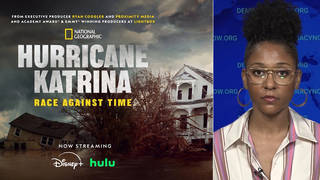
Media Options